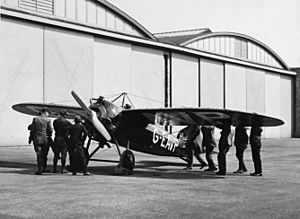Ernest Foot facts for kids
Quick facts for kids
Ernest Leslie Foot
|
|
|---|---|
| Nickname(s) | Feet |
| Born | 19 May 1895 Pulborough, Sussex, England |
| Died | 23 June 1923 (aged 28) Near Chertsey, Surrey, England |
| Allegiance | United Kingdom |
| Service/ |
British Army Royal Air Force |
| Years of service | 1914–1919 |
| Rank | Major |
| Unit | Oxfordshire and Buckinghamshire Light Infantry No. 11 Squadron RFC No. 60 Squadron RFC No. 56 Squadron RFC |
| Awards | Military Cross |
| Other work | Commercial and test pilot, instructor and air racer. |
Major Ernest Leslie Foot MC (born May 19, 1895 – died June 23, 1923) was a brave English pilot during World War I. He was known as a "flying ace" because he shot down five enemy planes. Ernest was also a very close friend of another famous pilot, Albert Ball.
Contents
Ernest Foot's Military Journey
Ernest Foot started his military career in the army. On October 27, 1914, he became a temporary officer. He was promoted to lieutenant on December 28, 1914. Later, he joined the Royal Flying Corps as a flying officer (observer) on October 21, 1915.
He learned to fly a Maurice Farman biplane at Farnborough. On December 20, 1915, he earned his pilot's license. He officially became a flying officer on February 10, 1916.
Flying with No. 11 Squadron
Foot was assigned to No. 11 Squadron RFC. Here, he became good friends with Albert Ball, another famous pilot. On July 23, 1916, he was made a flight commander. This meant he was in charge of a group of planes.
Between September 9 and September 15, 1916, Foot was very successful. Flying a Royal Aircraft Factory FE.2b, he destroyed three enemy aircraft.
Moving to No. 60 Squadron
The day after his third victory, Foot moved to No. 60 Squadron. He flew a special SPAD S.VII plane. With it, he destroyed an Albatros two-seater plane on September 28.
Later, on October 21, 1916, he used a Nieuport 17 to force down a Roland C.II plane. However, on October 26, Foot's plane was shot down by a German ace named Hans Imelmann. Amazingly, Foot managed to crash-land safely without injury.
On November 3, he was sent back to England to rest. Soon after, he received the Military Cross award for his bravery.
Joining No. 56 Squadron
On March 10, 1917, Foot joined No. 56 Squadron. This was the first squadron to use the new Royal Aircraft Factory SE.5 planes. He was again a flight commander.
However, an unfortunate car accident stopped him from flying for the rest of the war. Even so, he continued to serve the military. He was promoted to temporary major on April 30, 1918. He also worked as an instructor at a special flying school. On April 11, 1919, Foot left the Royal Air Force, ending his military career.
Life After the War
After leaving the Royal Air Force, Ernest Foot became a commercial pilot. He flew for the Handley Page Transport company. He flew passenger flights between London and Paris.
In April 1923, he took a new job. He became a test pilot and instructor for the Bristol Aeroplane Company. He also joined the Royal Air Force Reserve as a probationary flying officer.
Air Racing Adventures
Foot was also a well-known participant in air races. In July 1921, he competed in the Sixth Aerial Derby. He flew a Martinsyde F.4 plane. He had to stop during the first lap because of engine problems.
In September 1921, he led the "White Team" in a relay race. This was part of the first Aviation Race Meeting at Croydon Aerodrome. Again, his team had to withdraw due to mechanical issues.
In June 1922, at the Third Croydon Aviation Race Meeting, Foot placed third. He flew the Martinsyde F.4 in the First Sprint Handicap race.
His Final Flight
In June 1923, Foot entered the first Grosvenor Challenge Cup race. He flew a Bristol M.1D monoplane. The race had several stops.
When Foot landed at Filton Aerodrome, his plane had a fuel leak. He also seemed affected by the petrol fumes. After repairs, he took off again. Sadly, his plane crashed near Chertsey, and it caught fire. Ernest Foot was killed instantly. He had been married only a few months before.
Awards and Recognition
Ernest Leslie Foot received the Military Cross for his bravery.
- Military Cross
- Temporary Lieutenant (Temporary Captain) Ernest Leslie Foot, General List and R.F.C.
- He showed amazing skill and courage. While flying alone, he attacked five enemy planes. He forced one to crash. He often showed great determination when fighting enemy aircraft.
 | Aaron Henry |
 | T. R. M. Howard |
 | Jesse Jackson |


